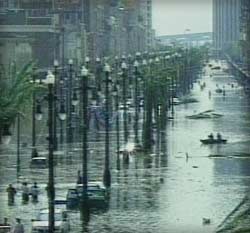
"The Storm," an hour-long FRONTLINE investigation, examines how and why government at every level -- local, state and federal -- was unprepared, uncoordinated and overwhelmed in dealing with the Hurricane Katrina disaster that devastated the Gulf Coast in the late summer of 2005 and killed more than 900 people in New Orleans. This report examines the chain of decisions that slowed federal response to the calamity in New Orleans, government's failure to protect thousands of Americans from a natural disaster that long had been predicted, and the state of America's disaster-response system four years after 9/11. Correspondent and producer Martin Smith chronicles the disaster and the decision-making and relief efforts, drawing on footage of the devastation and suffering in New Orleans and interviews with key government officials from New Orleans to Washington. The interviews include former Federal Emergency Management Agency Director Michael Brown -- in his first televised interview since he resigned -- Louisiana Governor Kathleen Blanco, New Orleans Mayor Ray Nagin, former Homeland Security Secretary Tom Ridge and former Deputy Secretary James Loy. Brown tells Smith that he misled the public in his televised statements during the crisis in order to quell panic: "I'm not going to go on television and publicly say that I think that the mayor and the governor are not doing their job … they don't have the sense of urgency," says Brown. "I'm not going to say that publicly." Privately, he thought Governor Blanco's requests for help were vague and confused. But Blanco remembers it differently: "Nobody ever told me the kinds of things that they could give me. … I wanted whatever assets they had." But the mayor of New Orleans, Ray Nagin, tells FRONTLINE that valuable time was lost negotiating over who should take charge and talks about some of the frustrating meetings. "I didn't care who got the job done, whether it was a state or whether the feds," says Nagin. "In my sense, there was a dance going on about who had ultimate authority." In examining the Katrina story, FRONTLINE looks at the rocky history of the Federal Emergency Management Agency, FEMA, and how in the wake of 9/11, FEMA was downgraded from a Cabinet-level agency to a subdepartment in the new Department of Homeland Security (DHS). Former DHS Secretary Tom Ridge maintains FEMA was not hurt by the reorganization, but Michael Brown disagrees. "There was almost $80 million that was taken out of FEMA's budget to use in other areas of the Department of Homeland Security," says Brown. "The Storm" also examines the state of America's disaster response and whether we have the ability to handle future catastrophic events in light of the failures with Hurricane Katrina. Correspondent Smith asks officials why, four years after 9/11, the U.S. still doesn't have a resilient and interoperable communications system in place for first responders in cities and metropolitan areas. Several officials point to state and local government's opposition to having federally mandated standards for communication systems and other homeland security equipment. According to Richard Clarke, an expert on homeland security, with few national standards, "there are no specific goals, no specific requirements. … As a result, we have cities that bought air-conditioned garbage trucks with homeland security money without ever solving their communications problems." home + introduction + watch online + interviews + analysis + 14 days posted nov. 22, 2005 FRONTLINE is a registered trademark of wgbh educational foundation. | SUPPORT PROVIDED BY
|